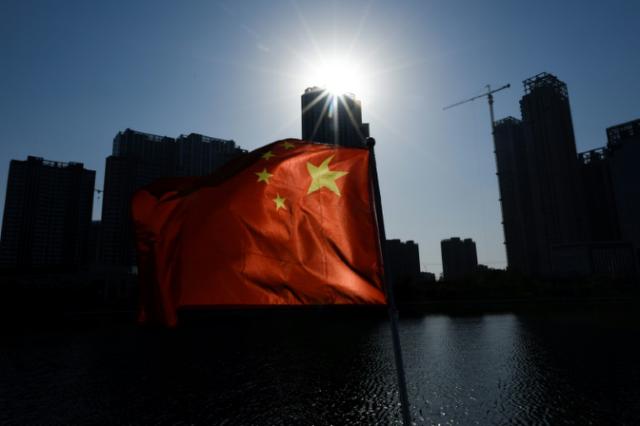CHINA’S 9-LINE: Second China aircraft carrier enters service
.
.
China’s second aircraft carrier entered service on Tuesday, adding major firepower to its military ambitions as it faces tensions with self-ruled Taiwan as well as the US and regional neighbours around the disputed South China Sea.
The commissioning of the warship, named the Shandong, puts China in a small club of nations with multiple aircraft carriers, and the country is reportedly building a third.
China’s first domestically built carrier was delivered to the People’s Liberation Army navy in Sanya, on the southern island of Hainan, at a ceremony attended by President Xi Jinping, state media said.

. .
China has one other carrier — the Liaoning — a repurposed Soviet vessel bought from Ukraine that went into service in 2012.
Around 5,000 people attended Tuesday’s ceremony, singing the national anthem as the national flag was raised, state broadcaster CCTV said.

. .
Xi inspected an honour guard during the ceremony and met with service personnel on board the warship.
Hainan province is in the South China Sea east of Vietnam, which has competing claims in the waterway along with China, Malaysia, the Philippines, Taiwan and Brunei.
The 700-metre (2,400 feet) long carrier dock in Sanya is able to service multiple carriers simultaneously and is the largest port of its kind in Asia.
It is also home to the Yulin nuclear submarine base.

. .
In November China confirmed that the Shandong aircraft carrier had sailed through the Taiwan Strait for “routine” training and tests, drawing the ire of Taipei.
China, which sees democratic Taiwan as part of its territory, has stepped up military drills around the island since Beijing-sceptic President Tsai Ing-wen came to power in 2016.
“With several Chinese carriers, the east coast of Taiwan may no longer be safe for Taiwan’s defenders,” said Steve Tsang, head of the China Institute at the School of Oriental and African Studies in London.
But it would take nearly a decade for the new carrier to be combat-ready, he added.

. .
“The carriers do not really effect the balance of force between China and the US –- or Japan with its sophisticated sea and air capabilities,” said James Goldrick, a naval and maritime strategy expert at the Australian National University
“They are extremely vulnerable to submarine attacks, particularly nuclear-powered submarines such as the US Navy operates in the Western Pacific.”
– Big ambitions –
Beijing has been ramping up its military ambitions and in July outlined a national defence plan to build a modern, high-tech army.
China’s defence spending is second only to the United States — though it still lags far behind — and it said earlier this year it planned to raise it by 7.5 percent in 2019.

. .
In March, Beijing said it would spend 1.19 trillion yuan ($177.6 billion) on defence in 2019, after it increased its outlay by 8.1 percent to 1.11 trillion yuan in 2018, according to a government report presented at the start of the annual meeting of the National People’s Congress (NPC).
The nationalistic Global Times said Tuesday that thanks to “significant improvements,” the second carrier is “not a copy of the first one and is much more powerful”.
The carriers “have the potential to greatly increase China’s capacity to coerce weaker Asian and Indian Ocean states, as well as to intervene to protect Chinese nationals and interests in failing states”, Goldrick said.

. .
A US think-tank reported in May that recent satellite photographs indicated that construction of a third Chinese aircraft carrier was well under way.
Adding a third aircraft carrier will put China in an elite club among naval powers but it will still lag far behind the United States, which has 10 nuclear-powered Nimitz-class “supercarriers” currently in service. /

. .

All photographs, news, editorials, opinions, information, data, others have been taken from the Internet..aseanews.net










